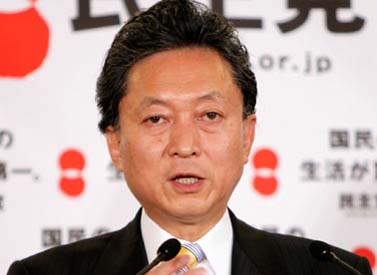Reformist Yukio Hatoyama vows to change old Japan
 Tokyo - Yukio Hatoyama is promising to change Japan if voters side with the party he leads, the opposition Democratic Party of Japan (DPJ), during Sunday's parliamentary elections.
Tokyo - Yukio Hatoyama is promising to change Japan if voters side with the party he leads, the opposition Democratic Party of Japan (DPJ), during Sunday's parliamentary elections.
The party's chances are good, analysts said, with the latest opinion polls showing the DPJ leading with 36-per-cent support among voters, a comfortable margin over the 16 per cent for the ruling Liberal Democratic Party (LDP).
If the DPJ wins, the 62-year-old political blueblood Hatoyama would likely become Japan's next prime minister and put an end to more than a half-century of nearly uninterrupted rule by the LDP.
"The day has finally come for us to rewrite our history," the contender to Prime Minister Taro Aso said during the campaign.
Such a result would be the highlight of a political career for Hatoyama, who in 1993 left the LDP, which his grandfather established and his younger brother, Kunio, serves. He now is aiming to reform the world's second-largest economy.
To start with, he has supported an amendment to the pacifist constitution, which was drafted by the United States after World War II. It bars Japan from having armed forces with war potential. Hatoyama wants to change the charter to allow for military deployments under UN mandates.
As far as Japan's relations with its chief ally, the United States, Hatoyama said his party would maintain the alliance as a priority, but cautioned that, "We want to move away from US dependency to a more equal alliance."
Concerning relations with Japan's East Asian neighbours, Hatoyama said that if he is elected prime minister, he would not visit the Yasukuni Shrine in Tokyo, which honours more than 2.5 million war dead, including war criminals from World War II.
Previous premiers and other government officials have visited it, provoking protests from other Asian nations, such as the Koreas and China, who were under Japan's brutal colonial rule before and during the world war.
Hatoyama has been quoted as saying that Japan's relations with China and South Korea "would improve and further develop with the 'correct recognition of history.'"
Domestically, the political centrist has proposed granting foreign residents in Japan the right to vote in local elections because "he believes that the Japanese people are not the sole owners of the Japanese archipelago."
He and his party are also committed to reorganizing the bureaucracy and cutting wasteful spending.
Hatoyama is not all about work, however. Affectionately called "alien," sometimes for his tendency to voice personal views off the cuff and simply for his looks, he released a record in 1988 called Take Heart: Fly Away, Peace Dove.
His family background is not only in politics but also in business. Hatoyama's mother is a member of the founding family of the Bridgestone Co, the world's largest tyre manufacturer, making her son the richest lawmaker in the House of Representatives, the more powerful chamber of Japan's bi-cameral Diet.
The scion of a political dynasty who now seems poised to assume Japan's top post had not originally planned to become a politician. Hatoyama chose engineering instead of political science for a major at the University of Tokyo, and attended graduate school at Stanford University in California.
After teaching at Japanese universities for several years, he became an LDP member in 1986, following in the political footsteps of his grandfather who was premier in the mid-1950; his father, who was foreign minister 20 years later; and his brother, a former minister in Aso's cabinet.
After leaving the LDP, Hatoyama founded the New Party Sakigake and then helped establish the DPJ.
The native of the northern island of Hokkaido long served as right-hand man to former party president Ichiro Ozawa, until Ozawa stepped down in May over a scandal about a corporate political contribution. Hatoyama backed his boss throughout the ordeal and succeeded him.
Later, however, Hatoyama himself had to apologize to the public for the misreporting by his office of political contributions of about 22 million yen (239,000 dollars) made during 2005-09 under the names of deceased people. An investigation is ongoing.
But scandal has also plagued the LDP, which in addition has been blamed for political indecision and failing to address such domestic issues as Japan's shrinking, ageing population.
As a result, the DPJ and Hatoyama have risen in popularity ahead of Sunday's voting. (dpa)